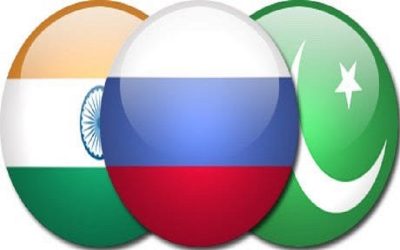Russia’s Strategy in South Asia: Lavrov’s Trip to India and Pakistan Is a Major Event
Russia will reinforce its traditional relations with India while continuing to pioneer its new partnership with Pakistan.

All Global Research articles can be read in 51 languages by activating the “Translate Website” drop down menu on the top banner of our home page (Desktop version).
***
Russian Foreign Minister Sergey Lavrov is visiting India and Pakistan this week. His trip to South Asia is a major event because of the larger strategic context in which it’s occurring. Russia’s top diplomat will be accompanied by Russian Special Envoy for Afghanistan Zamir Kabulov, who’s expected to brief both regional countries about the latest progress in the Afghan peace process. Moscow recently hosted yet another round of talks on this issue which saw all sides make progress towards a political solution to the long-running war, but it wasn’t without a little bit of controversy.
Some in India were upset that their country wasn’t invited to participate. That wasn’t an intentional slight on Russia’s part since it clarified that only those states which have ties with both warring parties – the Kabul government and the Taliban (which is designed by many as a terrorist group) – would join the talks in order to facilitate further progress. India doesn’t have any ties with the Taliban and had also only participated in previous rounds of Russian-hosted talks in an unofficial capacity as a result. Nevertheless, Mr. Kabulov is expected to bring the Indians up to speed about what was accomplished.
The Russian Foreign Minister might also update India about the outcome of his recent trip to China. Moscow previously praised February’s synchronized disengagement agreement between Beijing and New Delhi which saw them responsibly take steps to peacefully resolve last summer’s dispute along the Line of Actual Control (LAC). Russia passionately believes in the merits of trilateral coordination through the Russia-India-China (RIC) framework, so its top diplomat will probably discuss that as well even though it isn’t the main item on his agenda. It’s important for Russia, India, and China to more closely cooperate against American aggression.
Speaking of which, India’s planned purchase of Russia’s S-400 air defense systems will probably be among the most important topics that Foreign Minister Lavrov discusses during his trip. The US is threatening to sanction India if it goes through with this deal under the controversial “Countering America’s Adversaries Through Sanctions Act” (CAATSA). This stance is extremely counterproductive for its own national interests since it stands to complicate those two countries’ newfound strategic partnership. India thought that it could trust the US as a reliable ally but it’s quickly learning that such an optimistic expectation might have been premature.
Russia is arguably a much more reliable ally for India than the US ever will be, but economic ties between the two continue to disappoint their supporters. It’s for this reason that Foreign Minister Lavrov will likely discuss ways to scale them up in order for trade to finally reach its full potential with time. One of the most exciting means through which this could be accomplished is through the Vladivistok-Chennai Maritime Corridor (VCMC) that both sides unveiled in September 2019 during Prime Minister Modi’s attendance at the Eastern Economic Forum in Vladivistok as President Putin’s guest of honor at the time.
Moving along to Pakistan, Foreign Minister Lavrov’s trip will be first time in many years that Russia sent its top diplomat to the South Asian country. Russia and Pakistan used to be Cold War-era rivals and even fought a proxy war in Afghanistan in the 1980s, which is why it’s ironic that it’s Afghanistan of all issues that’s largely responsible for their rapid rapprochement in the present day. Both sides will of course discuss the Afghan peace process, but also other topics of shared interest such as anti-terrorist cooperation and energy. Earlier this year, Russia agreed to build the Pakistan Stream Gas Pipeline, which will begin construction this summer.
Moreover, Foreign Minister Lavrov will likely learn more about Pakistan’s multipolar grand strategy that its political, diplomatic, and military leaders simultaneously unveiled in the middle of last month during the inaugural Islamabad Security Dialogue. Pakistan envisions itself serving as the “Zipper of Eurasia”. It believes that its geostrategic location and hosting of the Belt & Road Initiative’s (BRI) flagship project of the China-Pakistan Economic Corridor (CPEC) enable it facilitate the integration of the Shanghai Cooperation Organization, the Eurasian Economic Union, and the South Asian Association for Regional Cooperation (SAARC).
It’s for these strategic reasons why Foreign Minister Lavrov’s trip to South Asia is a major event. Not only will it advance the Afghan peace process, but it’ll also strengthen Russia’s regional presence in South Asia. Moscow will reinforce its traditional relations with New Delhi while continuing to pioneer its new partnership with Islamabad. This shows how important South Asia has become, both for the 21st century in general and Russian grand strategy in particular. Russia’s balanced approach in dispatching Foreign Minister Lavrov to both India and Pakistan perfectly epitomizes the win-win principles of President Putin’s Greater Eurasian Partnership.
*
Note to readers: please click the share buttons above or below. Forward this article to your email lists. Crosspost on your blog site, internet forums. etc.
This article was originally published on OneWorld.
Andrew Korybko is an American Moscow-based political analyst specializing in the relationship between the US strategy in Afro-Eurasia, China’s One Belt One Road global vision of New Silk Road connectivity, and Hybrid Warfare. He is a frequent contributor to Global Research.
Featured image is from OneWorld

